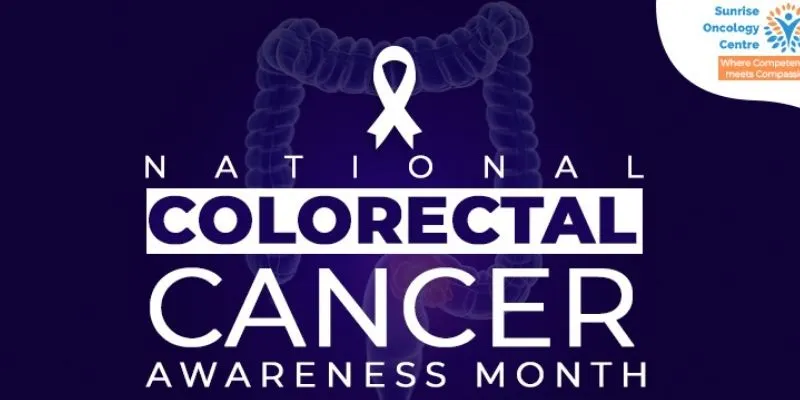Colorectal cancer starts in the colon or the rectum. It is a type of cancer that usually begins as small, noncancerous, or benign clumps of cells called polyps that form on the inside of the colon. Over time some of these polyps can become colon cancers
The colon is the large intestine or large bowel. The rectum is the passageway that connects the colon to the anus.
These cancers can also be called colon or rectal cancers, depending on where they start. Colon cancer and rectal cancer are often grouped because they have many features in common. It typically affects older adults, though it can happen at any age.1,2,3
Colorectal cancer is the third leading cause of cancer-related deaths in both men and women.4
Some polyps can develop into cancer over time, but not all polyps do. The likelihood of a polyp developing into cancer is determined by the sort of tumor. Polyps are classified into several kinds.1
- Adenomatous polyps (adenomas): These polyps sometimes change into cancer. Because of this, adenomas are calledpre-cancerous conditions. The 3 types of adenomas are tubular, villous, and tubulovillous.
- Hyperplastic polyps and inflammatory polyps: These polyps are more common, but in general, they are not pre-cancerous.
- Sessile serrated polyps (SSP) and traditional serrated adenomas (TSA): These polyps are often treated like adenomas because they have a higher risk of colorectal cancer.
- Signs and symptoms:2,3
Symptoms of colorectal polyps and colorectal cancer are not always present at first. A person may not be aware that they have polyps or colorectal cancer.
Some of the signs and symptoms are:
- A recurrent alteration in bowel patterns, such as diarrhea, constipation, or a change in feces consistency.
- Rectal bleeding or blood in your stool
- Persistent abdominal discomforts, such as cramps, gas, or pain
- A feeling that your bowel doesn’t empty completely
- Weakness or fatigue
- Unexplained weight loss
- Risk factors for colorectal cancer:5,6
Many lifestyle-related factors have been linked to colorectal cancer. More than half of all colorectal cancers are linked to risk factors that can be changed.
- Being overweight or obese: Being overweight raises the risk of colon and rectal cancer in people, but the link seems to be stronger in men.
- Not being physically active: You have a higher risk of getting colon cancer if you are not physically active. Regular, brisk physical exercise can help reduce your chance.
- Certain types of diets: A diet heavy in processed and red meat increases the chance of colon cancer. Vitamin D deficiency may also increase your chances.
- Smoking: The likelihood of developing and dying from colon cancer is higher in long-term smokers than in non-smokers.
- Alcohol use: Moderate to heavy alcohol consumption has been related to colorectal cancer. Even occasional or mild drinking has been linked to some risks.
- Age: The disease most frequently affects individuals over the age of 50, and the likelihood of developing colorectal cancer increases with each decade after age 40.
- Gender: Men are more likely to develop colorectal cancer. In terms of colon cancer, men and women are both at risk, but men are more prone to develop rectal cancer.
- A family history of colorectal cancer or adenomatous polyps: The majority of colorectal tumors are discovered in individuals without a family history of the disease.
- Treatment:2,7
It depends on the location, stage, and other health concerns of your cancer that determines which treatments are most likely to help you. The most common treatment for colon cancer is surgery to remove cancer. There may also be a need for other treatments, such as radiation therapy and chemotherapy
- Surgery: For early-stage colon cancers, surgery is frequently the primary treatment. The stage of cancer determines the sort of surgery, such as polypectomy and local excision.
- Chemotherapy: Chemotherapy employs medication to kill cancer cells. In cases where the colon cancer is more advanced or has spread to the lymph nodes, chemotherapy is typically administered after surgery. In this way, chemotherapy may kill any cancer cells that remain in the body and help reduce the risk of cancer recurrence.
- Radiation therapy: Radiation therapy uses high-energy radiation (like x-rays) or particles to kill cancer cells. Colon cancer is less frequently treated with it than rectal cancer. Radiation treatment may function more effectively for some colon and rectal cancers if chemotherapy is given at the same time.
- Targeted drug therapy: Targeted drug treatments focus on specific abnormalities present within cancer cells. Targeted drugs are typically reserved for people with advanced colon cancer.
- Immunotherapy: Immunotherapy is the use of medicines to help a person’s immune system better recognize and destroy cancer cells. Immunotherapy can be used to treat some people with advanced colorectal cancer.
- Prevention:5
Here are some ways to help protect your colorectal health.
- Colorectal cancer screening: Screenings are examinations that search for cancer before symptoms and signs appear. These tests can identify colon or rectal cancer earlier when successful treatments are more probable. For individuals with an average chance of developing cancer, testing should begin at age 45.
- Healthy diet&Physical activity: A lower risk of colon or rectal cancer has been related to diets high in fruits, vegetables, and whole grains.If you are not physically active, you may have a greater chance of developing colorectal cancer. Being more active may help reduce your risk.
- Quit smoking: People who have been smoking for a long time are more likely than people who don’t smoke to develop and die from colon or rectal cancer.
- Avoid alcohol: Alcohol use has been linked with a higher risk of colorectal cancer. It is best to not drink alcohol.
Colorectal Cancer Awareness Month is observed in March to highlight the importance of screening for colorectal cancer, as well as to promote healthy lifestyle habits that can decrease a person’s risk of developing colorectal cancer.8,9
Reference:
- What Is Colorectal Cancer? Available at: https://www.cancer.org/cancer/colon-rectal-cancer/about/what-is-colorectal-cancer.htmllast accessed on 24th March 2023.
- Colon cancer Available at:https://www.mayoclinic.org/diseases-conditions/colon-cancer/symptoms-causes/syc-20353669last accessed on 24th March 2023.
- What Is Colorectal Cancer? Available at:https://www.cdc.gov/cancer/colorectal/basic_info/what-is-colorectal-cancer.htm#:~:text=Colorectal%20cancer%20is%20a%20disease,the%20colon%20to%20the%20anus.last accessed on 24th March 2023.
- Key Statistics for Colorectal CancerAvailable at: https://www.cancer.org/cancer/colon-rectal-cancer/about/key-statistics.htmllast accessed on 24th March 2023.
- Colorectal Cancer Risk FactorsAvailable at: https://www.cancer.org/cancer/colon-rectal-cancer/causes-risks-prevention/risk-factors.htmllast accessed on 24th March 2023.
- Colorectal Cancer: 9 Things That Raise Your RiskAvailable at: https://www.webmd.com/colorectal-cancer/guide/risk-factors-colorectal-cancerlast accessed on 24th March 2023.
- Treating Colorectal Cancer, Available at: https://www.cancer.org/cancer/colon-rectal-cancer/treating.htmllast accessed on 24th March 2023.
- Catching cancer before it can advance, available at:https://www.ccalliance.org/last accessed on 24th March 2023.
- Colorectal Cancer Awareness Month: Screenings Save Lives, Available at: https://www.facs.org/for-medical-professionals/news-publications/news-and-articles/cancer-programs-news/030223/colorectal-cancer-awareness-month-screenings-save-lives/last accessed on 24th March 2023.

